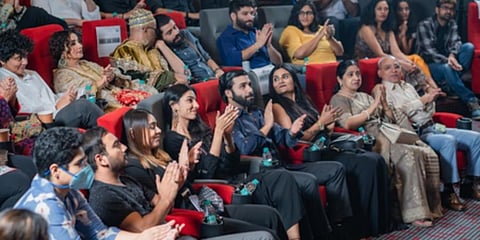

Film festivals and screenings go beyond carving a space for cinephiles to congregate and experience the magic of cinema together. These events also help independent filmmakers reach out to an audience who not just appreciate the former’s work but also provide effective feedback. This is especially important at a time when young filmmakers are willing to experiment with unexplored themes.
We witnessed this idea come full circle at the inaugural event of Yellowstone International Film Festival’s (YIFF) third edition that took place at DLF Cyber Park, Gurugram, on Friday. Meant to promote independent cinema, this Festival—it concludes on October 7—commenced with a screening of Mumbai-based director Faraz Arif Ansari’s short film Sheer Qorma followed by the Rasika Dugal-starrer magic realist film Fairy Folk. “The need for independent film festivals comes from the struggle and lack of representation I felt in my early years. I thought when I have some ability in my limited capacity, I would organise festivals that would be home for independent filmmakers from across the world. The audience needs to wake up to the magic of independent films because they are brilliant,” said Tushar Tyagi, founder, YIFF. An award show was also organised at the inaugural event.
Reel appreciation
This year, YIFF has been organised as a hybrid event. A showcase of more than 50 independent films from over 16 countries will be part of the event, with 10 films being screened physically at the venue in Gurugram. The physical line-up features a slew of indie movies including Pakistani filmmaker Seemab Gul’s short film Sandstorm (2021) that tells the story of Zara, a schoolgirl in Karachi, Sameer Sharma’s 2021 film Master Ji —it is about the journey of a teacher during the lockdown. Talking about the curation, Tyagi—whose short film Saving Chintu was shortlisted for Oscars 2021—added, “The usual criteria for all film festivals is that the story has to be nice, etc.. But for us, it was about what you [the filmmaker] are trying to say through your story. Is it socially relevant?” The virtual line-up at YIFF also includes a number of features, shorts, animated films, and documentaries.
An honest take
Los Angeles-based Naman Gupta’s Coming Out with the Help of a Time Machine—one among the several films screened at YIFF—the filmmaker blends fiction with a social issue by exploring the process of sharing one’s gender identity and sexual orientation with others. “It [the film] is about the universal themes of family and acceptance, and that in the end, love is all that matters. On this small planet in an infinite universe, our humanity and each other is all we have,” shared Gupta with The Morning Standard. Talking about screening his film in India, he added, “I hope our film is able to make people laugh a little, cry a little more, and maybe start a conversation.”
Breaking ground
“As a filmmaker, I am drawn to subjects I don’t get to see,” shared New York-based Indian filmmaker Snigdha Kapoor whose directorial Look Like You is a part of the YIFF line-up. Kapoor’s film is about a South Asian queer woman, Tara who goes to meet his biological son—he lives with his white adoptive parents. “I chose to tell the story from a queer South Asian lens because our socio-cultural environment greatly impacts how we see, express, or repress our identities, especially if they don’t conform to the dominant culture and norms. I approached the subject like a documentary but made narrative choices to highlight a specific lens that rarely gets the spotlight,” the director added.
“We are so excited to screen our film at YIFF in our hometown, Delhi—it is a place where activism and grassroots movements have always existed. With more dialogue and steps towards inclusive laws being passed in India around LGBTQ+ rights, I hope this story of adoption will allow the festival audiences to continue the dialogue by reflecting on our shared desire to belong and be accepted for who we are,” she concluded.